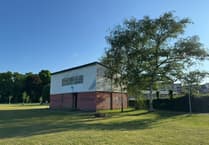THE redevelopment of the Albion House site opposite Woking Station has received a £7 million investment boost from a banking group.
NatWest has weighed in to help finance the remodelling of what was once the town’s tallest building – in a project that includes the removal of the “white elephant” solar canopy.
An artist’s impression of the development confirms that the canopy, built 10 years ago at a cost of more than £4 million, is to be demolished.
The Albion House complex of offices, shops and a nightclub is being renamed Woking One, dubbed a new “gateway” between the station and the town centre.
With a new public piazza, the scheme will have around 35,000sqft of office space on eight floors, as well as new restaurant and shopping facilities.
The development, due to open next spring, is a joint project between the property company Wrenbridge and Palmer Capital in co-operation with Woking Borough Council, which built the canopy.
The exterior of Albion House, which was built in the 1960s, is being re-modelled to modern designs. The interior has been stripped back to the concrete structure and rebuilt, with large amounts of asbestos insulation removed.
Wrenbridge director Chris White said Woking One would bring new jobs and amenities to Woking.
“The proximity to the station means that Woking One offers unrivalled connectivity to London from Woking,” he added. “The location, combined with the high specification of the offices and amenities including the new restaurants will ensure that Woking One appeals to a breath of occupiers.”
NatWest spokesman Lee Franklin said: “The redevelopment of Woking One is a great opportunity to bring more business into the town. As an established commercial centre less than 30 miles from central London, it is also vital that Woking enhances its transport and infrastructure links to bring further economic benefits to the area.”
Albion House, built on the site of the Albion Hotel, was the tallest building in town until the 15-storey BAT tower block, later renamed Export House, was completed in 1974.
The solar canopy, finished at the end of 2007, cost a total of £4.2m, including the rerouting of electricity cables and sewers. High Street was closed for several months while the work was carried out.
The steel and glass structure was conceived as a “stunning gateway” to the centre of Woking. Its 35,000 photovoltaic cells were expected to produce an estimated 51,000 to 58,000kWh of electricity a year.
Albion Square was remodelled with cobbles, new paving, raised flowerbeds and benches as part of the project.
But the canopy’s running costs, insurance and the council’s debt repayments have far exceeded the revenue from electricity generated, leading the council to cut its losses and allow the demolition.




